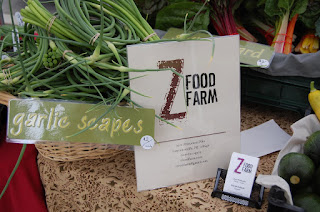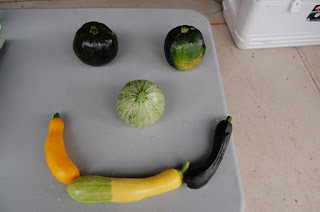Since last time a great deal has been taking place at Z Food Farm. Prior to providing an update on various events there is an issue of importance to mention- Bees. Over the course of the past few years there have been reports about a collapse in bee colonies in the United States. To quote from an article, written by Alison Benjamin, that was posted on Alternet.org- "Disturbing evidence that honeybees are in terminal decline has emerged from the United States where, for the fourth year in a row, more than a third of colonies have failed to survive the winter." Considering the significant importance of bees to the cycle of farming and bring food to your table this is an issue that can not be overlooked. To read the full article go to-
http://www.alternet.org/story/146701/ At this time Z Food Farm is now home to five bee hives. One is left over from last year. One is a 'rescue' hive- bees were swarming at a construction site and were close to being 'forcibly' removed. Through the intervention of someone who knew that David's friend Gab had an interest in bees, David was brought in to constructively move the bees to a safe location, Z Food Farm. At this time the hive is doing well. And there are three hives that belong to a new friend of Z Food Farm, Frank. Frank has a strong passion and commitment to bees and in addition to caring for his hives has been a valued asset in helping to tend to the needs of David's two hives. He is a good do-bee (a reference to those old enough to remember Romper Room). Here are some pictures showing the bees being buzzy.



It is not too much of a stretch to say, no bees, no food.
Jumping ahead of some events, today, June 6, was a new first for Z Food Farm- the first farmers' market. And it was only appropriate that David's first market was at the Lawrenceville Farmers' Market since that is the market David has been at for the past five years. As previously mentioned, getting the farm operation up and running took longer than anticipated. Building the greenhouse and putting up the deer fence delayed both the seeding of new plants and then the planting of those plants. The meaning of this is that David is running behind in his having produce available for sale at market. But, not to be deterred, David did have potted tomatoes, lettuce, basil, other herbs, and Swiss Chard plus garlic scapes available for sale. It was great to renew contact with customers (friends) who have been buying produce from David over the past few years and to make new customers (friends). Markets provide David, and other farmers, the opportunity to showcase the fruits (the vegetables) of their labor of love. In addition to selling at the Lawrenceville Market this year (Sundays, 9-2), Z Food Farm will be selling its produce at two other locations- Saturdays at Rittenhouse Square in Philadelphia (
Rittenhouse Farmers' Market Hours: 9:30 am to 3 pm.
Location: Walnut Street (south sidewalk), west of 18th Street) and Wednesdays at Z Food Farm!!! (Noon to 7). Go to
www.zfoodfarm.com for directions). Sales at the farm will officially start Wednesday, June 16. The date that Z Food Farm will make its initial appearance at the Rittenhouse Square Market will be announced as soon as that decision is made.
Here are pictures from Z Food Farms first market day.
The truck is loaded and ready to go.

All is ready and good to go.

The inaugural debut of Z Food Farm. The sign is not the final version of the farm logo. To the left of the sign you can see some of the lettuce. To the right of the sign, lying on the table, are the garlic scapes. (Scapes are the foliage that grows from the bulb of garlic as it grows under the surface of the ground. The taste of scapes is milder and more mellow than garlic; saute them up with just about anything you can think of.

Tomatoes, tomatoes, and more tomatoes. If you are going to grow your own tomatoes, it is strongly encouraged that you purchase your plants from a local farmer. Not to disparage large commercial sellers, buying local enhances the odds that you are getting a plant that is in good health and free of disease. This can't be guaranteed, but it is increasing your odds. Local conventional is better than box stores. Local organic is better yet. Not sure what you want, you'll get better answers from the farmer growing the tomatoes than you will from someone at a box store. And if you have any questions as your plant is growing you can stay in touch with the farmer who sold you the plant. Purrrfect!!

Let-uce help you pick the specific type of lettuce you would like to grow. When you buy plants or produce at your favorite local farmers' market you have the opportunity to try new varieties of all sorts of produce, including lettuce and tomatoes.

Yes, you too can grow your very own Swiss Chard in your home garden. Swiss Chard is one of those leafy veggies that are wonderfully healthy for you.

Herbs- chives, spearmint, lemon verbena, basil, lemon thyme. Again, growing your own can be great fun. If you have a dehydrator you can grow your own herbs, dry them, and enjoy your very own herbs throughout the year.

That's it for now. Regardless of where you live I'm confident that you can find a farmers' market nearby. This is the time of year when you can purchase your veggies locally and have them fresh to your table from the nearby field from whence they came. While Z Food Farm will be certified organic (David is in the process of obtaining his certification), if organic isn't of critical importance to you, please still make the effort to shop a the local farmers' market close to you. Today, more than has occurred for a long time, the consumer has more alternative options in where to purchase their produce. Conventional local is great. Conventional organic is even better.
Good health and good eating to one and all.


























